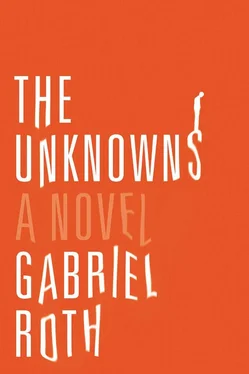“Are you nervous?” Maya asks me.
“Nah,” I say reflexively. “Not really. A little.”
She smiles. “Is it all going to be super technical? Like, give me an estimate of how much I’m going to understand.” This self-deprecating reminder of my expertise is reassuring, as she intends it to be.
“Oh, no, it’ll be general-audience stuff,” I say. “Whether you find it interesting or not is a different question.”
She rolls her eyes— This again —but affectionately, which is the best I can hope for.
My goal with the cab was for us to arrive within five minutes of the 10 a.m. start time of my first panel, “Privacy in the Internet Age.” I don’t want Maya to see too many hallway interactions — men in pleated khakis pitching me on their startup or framework. Construction on Folsom Street slows the cab down, and then we have to collect our badges (mine has my name in big letters; Maya’s just says GUEST), so we end up rushing through the hallway, past the programmers and MBAs in separate clusters.
We hurry into room 1F at eight minutes after ten to find the seats mostly full and three men milling around next to the big table on the dais: the moderator, the director of a consumer-rights nonprofit, and the maker of an anonymizer application. The moderator, a columnist for IT Security , hurries over. “Oh good, good, you’re here,” he says, with a funny mixture of deference and irritation. “We’re all ready to go!” Maya squeezes my arm and slips away to take a seat.
I take my spot behind a microphone and a pitcher of water as the moderator begins his introductions. I survey the crowd— hey, that’s kind of a lot of people —and locate Maya, near the back, grinning up at me, proud, maybe?
In response to the first question, Jack Schell from the Center for Digital Privacy makes an appeal to fear: your secrets are a commodity; your personal information is bought and sold; a stranger is using your credit card and your social security number.
The moderator, whose name I’ve forgotten, looks to me for the rebuttal. I’m here to represent the bad guys.
I give the stump speech I used to give journalists who asked about Demo1’s Big Brotherly implications. Sharing your information entails benefits and risks; decisions should be left to the individual. Demo1 presented its terms of use in clear English, required user opt-in, provided for admirably fine-grained preference-setting. We’re in the early stages of a new mass medium. Remember the controversy around cookies circa 1998? Some people found it nefarious that the Internet could know who you are; it was as if your TV was watching you. But that’s why the Internet’s going to destroy TV: it’s a mass medium that knows who you are. Whether you find that exciting or frightening is up to you. The subtext of the discussion, which I do not exhume, is Will everyone find out I look at pornography ? to which the answer is Probably not, but you never know .
Jack Schell says, “You founded Demographic of One in 1999. Last year you sold it to Atrium.” His lips twitch as he represses a smile; he’s prepping a haymaker. “All the data you collected on users was included in the sale — it’s what Atrium paid for. Do you trust them to use it properly?”
Actually, that information wasn’t worth much; we didn’t have enough users. What Atrium paid for was our technology, the thousands of hours of concentrated thought that Bill and I put into the codebase. But what would Jack Schell know about that? I say, “The terms of use still apply.”
“But you don’t have any control over whether they stick to them, do you?” he says. “That’s what happens when people’s personal information becomes a commodity.”
The crowd’s silence has a special attentive quality: no one was expecting actual conflict. “Eric Muller, care to respond to that?” says the moderator, clearly imagining himself on TV. The other panelist, whose app is pretty good, hasn’t said a word.
“You know what that information is?” I say. “It’s what brand of dog food you buy. It’s whether you wear a medium or a large. It’s all stuff that the girl who rings up your purchase at the supermarket already knows.”
“We’re in the middle of a sea change that very few people are aware of,” Schell says. He’s drawn himself up in his chair to indicate that he’s about to intensify his rhetoric. “The government is granting itself ever greater powers to track people’s private information. The Internet is being used by corporations to gather data on customers. And the individual’s right to control information about him-or herself is falling by the wayside. The point is not the intrinsic privacy value of any particular piece of data; the point is our right to a private self.” A few spectators nod their heads vigorously.
I can’t match Schell’s oratorical style, so I opt for brisk dismissiveness: There’s no need for all that speechifying . “The information we gathered exists on a level at which the individual is meaningless,” I say. I look straight at Schell and smile. “The facts about what you eat or drink or wear or buy have no value. It’s only when those facts are bundled with everyone else’s facts, when you’re subsumed in a mass of data, that you mean anything at all to Atrium or to any other company with six hundred million dollars in revenues last year. This whole discussion is predicated on a kind of paranoid egotism: Everyone wants to look at me, everyone’s interested in what I’m doing, the CIA is bugging my phone, Pfizer wants to steal my urine . There’s no need to worry about this stuff, because none of us is that important.”
I’ve gotten kind of worked up, and by the end I’m sitting upright and projecting just as forcefully as Jack Schell. People laugh, although they’re not sure if they’re laughing with me or at me. Schell smiles at me, an all-in-good-fun smile — the professional privacy advocate, after all, is a parasite on privacy-encroachers like me — and then the moderator, out of pity, invites the man from SecreSoft to explain where his product fits into the debate.
When time is called the applause goes beyond the perfunctory, and there’s a sense that the crowd has been given its money’s worth. I make eye contact with Maya as she utters a celebratory whoop. She looks relieved, and I realize that she was nervous for me.
The audience for the next panel has begun to trickle in and hover at the back of the room, so we hurry off the stage. The moderator thanks us fervently, and Jack Schell begins following up on a point he didn’t get to complete. Maya comes and stands close to me while he’s talking. I wait for Schell to wind down before giving him a little excuse-me nod and turning to her. “You were so great!” she says, slipping her arm around my waist. Schell registers this, and I feel myself puffing up. Masculine dominance has an unfamiliar, hormonal tang. “You were great too,” she says to Schell, perfectly.
As the group breaks up, someone at my elbow says, “Mr. Muller?”
A chunky guy in a T-shirt, with a beauty mark tragically reminiscent of Marilyn Monroe’s. Of course, he has an idea that he wants me to fund, something about “social marketing.”
“We’ve got to run,” I tell him. “Send me an email about it.” I lean in and murmur my address confidentially, although he could find it in ten seconds if he typed my name into Google. And then I take Maya’s arm and head off toward the main entrance.
She has to get to her office. We hold hands as I walk her to the bus stop.
“He didn’t have a good idea, that guy?” she says.
“Who knows?” I say. “Ideas are worthless. If it’s a good idea, two thousand people are working on it right now. The only way to make money on it would be to figure out which of them’s the smartest.”
Читать дальше












